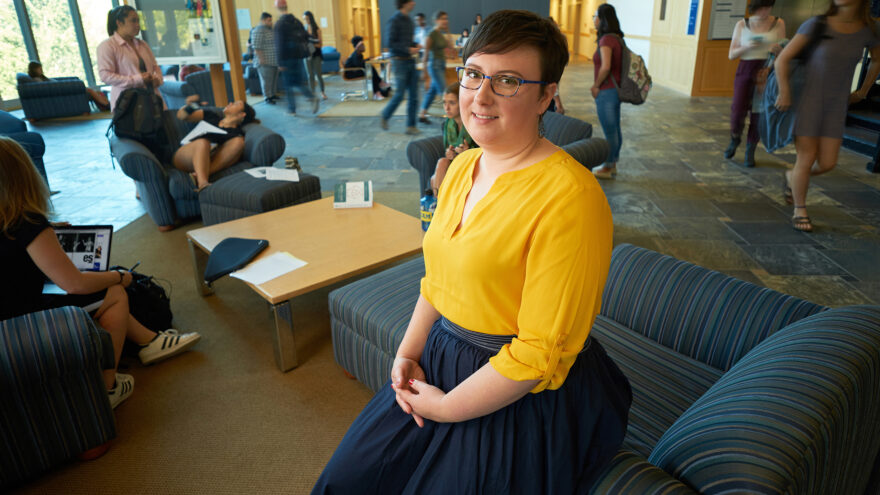The staff position “Director of Health and Wellness Education” comes with a purposefully broad title and a portfolio of responsibility to match. On any given day, the director may be called upon to address issues concerning sexual health, stress management, violence prevention, nutrition, alcohol and drug abuse, or how to prepare for cold and flu season.
Barbara McCall has held this job at Middlebury for four years after working in a similar capacity at Castleton University. She has a sunny disposition that seems to belie the weightiness of what she must encounter each day, though perhaps such a disposition is exactly what is required for the job. Magazine editor Matt Jennings caught up with her earlier this fall to chat about her profession, its inherent challenges, and what it means to be well and healthy.
Can I start with the possible stigma associated with “wellness,” the sense that it’s an affluent concept—you know, “Gwyneth thinks you should try this cleanse . . .”?
“Wellness” and “well-being” and “self-care” are all terms that get whitewashed in really unfortunate but very real ways. I understand that, and that’s why I am constantly asking students what wellness means to them, so that if they do have a misconception, I can educate them—and they can educate others—on what we mean by health and wellness.
I imagine that in an ideal scenario, your role is to reach a student before he or she has a serious problem . . .
That’s right. I want to help students integrate health and wellness strategies into their lives so that they are better prepared to face adversity or navigate new experiences.
So what does this look like?
Well, it can mean recognizing early warnings signs in themselves and others and to have a really keen understanding of what resources are available to them. That way, they seek help sooner and more effectively, which hopefully will lead to better outcomes.
But how does a student discover that you are a resource?
I’m there at the very beginning, at orientation, and then I’m just . . . there. I’m visiting students in the res halls, at team meetings if they’re athletes, at student leader trainings. It’s a gift to be able to work in informal educational settings and experiential settings. It’s not only rewarding to me as an educator, but it allows me to have a little more flexibility and fun with students, and I think that this model works for them, too.
I find it interesting that you report to the Office of the Dean of Students as opposed to the health center . . .
I find it to be a big advantage, actually. Working where I am, I’m dialed into residential life, judicial affairs, student activities. I feel like I can really integrate and understand what’s going on in student life.
To get to a place like Middlebury, our students have had to be high achievers. Do you feel like you need to teach them how to deal with vulnerability?
It’s an emphasis not just here but on campuses across the country—how to be vulnerable in an authentic way. Using social media to express “I’m having the worst time of my life,” is really different than sitting across from a person and expressing that feeling. And then if you think holistically about what it means to be vulnerable, what people might do when they feel vulnerable, well then, now we’re approaching the nexus of so many health and wellness issues that emerging adults are battling with, challenged by, exploring.
I imagine this job can be pretty stressful—how do you maintain your own sense of health and wellness?
I think it’s something we all wrestle with. I try and teach—oh, gosh, I don’t know if balance exists and I admit that readily in front of students—I think what I’m working on is work/life integration. I’m definitely not perfect, and I feel committed to being a work in progress: on display for students and colleagues to be transparent about what’s hard for me or what’s really working for me and sharing those successes as well as the “Here’s where I’m feeling really stuck.”

Leave a Reply